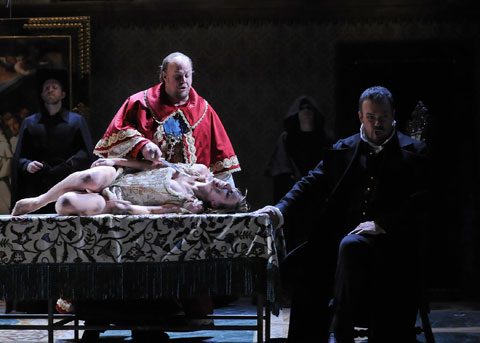
FIDELIO There’s nothing like a gratuitous torture scene to jazz up Beethoven’s noble opera. |
We've had a good deal of Beethoven recently, with the high bar being set by young Courtney Lewis — a former Zander Fellow and the current assistant conductor of the Minnesota Orchestra — and his extraordinary young chamber orchestra, Discovery Ensemble (with Joshua Weilerstein as the exceptional concertmaster). In the past couple of years, they've presented some of the best concerts around, though they still haven't found the audience they deserve. People come back again and again, but Sanders Theatre still remains less than half full. This is particularly disheartening because their mid-October concert was one of their most thrilling. It began with Bohuslav Martinu's grim pre–World War II Double Concerto for Two String Orchestras, Piano, and Timpani, then proceeded to an insinuating and enchanting Schoenberg Chamber Symphony No. 1 (yes, enchanting Schoenberg! — and witty!), and then on to one of the most exciting and moving performances of Beethoven's Eroica Symphony I've ever heard. Absolutely riveting from beginning to end (and it's not short), with one insight, one revelation, after another (especially in the structural highlighting of Beethoven's underlying rhythmic patterns), yet unfussy, completely honest, unmannered, forward-moving yet not mechanical — all brilliantly performed and totally engaged, both emotionally and intellectually. Without wallowing in sentiment, the funeral march was about as piercing and powerful as I've ever heard it.
It's rare for me to get excited about a Beethoven symphony these days. After the BSO's disappointing complete cycle last season, without the central presence of James Levine, I wasn't eager to hear any more Beethoven symphonies for a while. But I left Sanders Theatre wanting to hear them all. The Pastorale is on Discovery Ensemble's November 12 program at Sanders. Being there might make you even happier than reading about it.
I didn't envy new BSO assistant conductor Marcelo Lehninger, a cherubic 31-year-old from Brazil, his first Boston assignment: leading Beethoven's Violin Concerto with Pinchas Zukerman. A great conductor can provide this piece with shape and unity and weight, but here Lehninger was — perhaps inevitably — more accompanist than collaborator. Zukerman, in high celebrity mode and practically on automatic pilot, played less for large-scale continuity or "meaning" than for disconnected moments of bravura or prettiness. If you cared about what Beethoven had to say, this was not a satisfying performance. Too bad the BSO didn't pair Lehninger with the great Brazilian pianist Nelson Freire, who'll be here next month, since they've already toured together in South America.
Lehninger had a livelier and more personal presence in the opening piece, Samuel Barber's School for Scandal Overture (his scintillating and tricky first work for full orchestra), once a BSO staple but now rarely programmed. And though the Tchaikovsky Fifth Symphony that concluded the program drew impressive playing from the orchestra, and got a big ovation, this long, autobiographical work lacked a strong sense of direction (movements rather stopped than built to powerful climaxes) or inner life. The best Tchaikovsky conductors know how to fill even the composer's droopiest melancholy with a rhythmic urgency. Is it cruel to say that Lehninger conducted as if his job, not his life, depended on it? But I'm also curious to hear more from him.